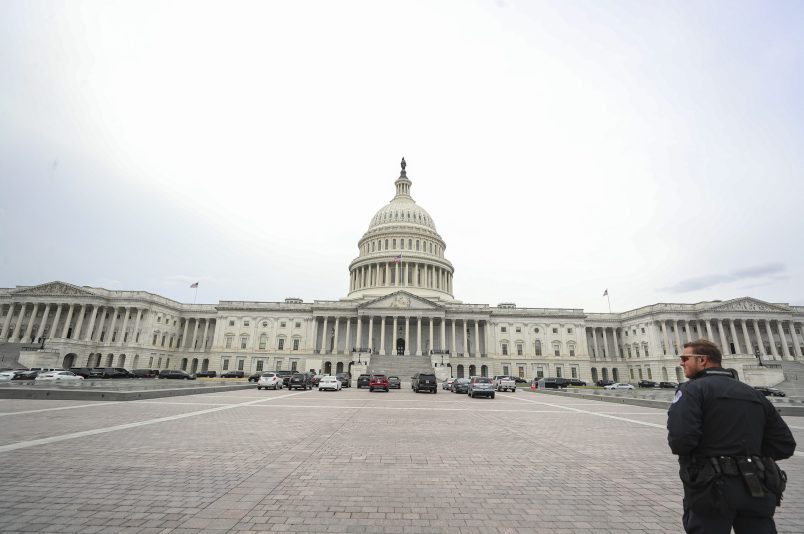As the year comes to a close, so does the 117th session of Congress. Time is running low for Democrats trying to cram their priorities through the chambers before a divided Congress takes over in January. Parts of Biden’s legislative agenda are still scattered across the parliamentary floor, like expanding the child tax credit and reforming the Electoral Count Act (ECA).
As has been the case for months, some experts are concerned about Congress’ ability to pass ECA reform during the lame-duck session, while others are optimistic.
Lawmakers across the aisle have been trying for the past year to reform the 135-year-old election law that Trump lawyer John Eastman tried to exploit to steal the 2020 election for Trump. As you’ll recall, Eastman sent Vice President Mike Pence a six-point plan outlining a way to call the election for the former president based on vague language in the ECA surrounding the vice president’s role in the vote certification process. The plan didn’t work, but experts worried about the gaps it exposed nonetheless.
Two separate bills were introduced this year to plug those holes: the Senate’s Electoral Count Reform Act (ECRA), introduced by Sens. Susan Collins (R-MA) and Joe Manchin (D-WV), and the House’s Presidential Elections Reform Act, introduced by Reps. Zoe Lofgren (D-CA) and Liz Cheney (R-WY). Both bills were supported on a bipartisan basis, but the ECRA appears closest to reaching Biden’s desk.
“It would clear up any lingering dispute about the vice president’s authority,” Adav Noti, senior vice president of the Campaign Legal Center, told TPM. “It would significantly raise the threshold for objecting to electoral votes in Congress. And it would create a dispute resolution mechanism so that any fights about who won the electoral votes in a given state would get resolved way before January 6.”
Last we heard, Sen. Amy Klobuchar (D-MI) had floated the possibility of attaching the ECRA to a must-pass bill like the National Defense Authorization Act (NDAA) or the omnibus spending bill, which she described as “looking more and more promising.” But the NDAA just passed with no election law reform in sight, and the deadline to pass ECA reform in this Congress is approaching quickly.
That’s caused some stress for those in the election law field like Matthew Seligman, a legal expert and fellow at Stanford Law School’s Constitutional Law Center, who’s pressed the urgency of reforming the ECA for months.
“The stakes could not be higher,” he told TPM. “If the ECRA doesn’t pass in the next couple of weeks, there will remain catastrophic risks of political manipulation of the counting of electoral votes.”
Election law has faced a bevy of threats in the two years since Trump incited an insurrection while trying to overturn the election, from election deniers running to control the levers of electoral power to a Supreme Court case that could enable partisan gerrymanders more extreme than ever before.
The greatest risk, Seligman says, is of governors or a hyper-partisan Congress manipulating the vote count to install their own candidate in the executive seat. “We were lucky to dodge that bullet in 2020,” he said, “but I don’t have a great deal of confidence that we would dodge it again.”
Election deniers losing their races in swing states is encouraging, he noted, but many were still elected into office elsewhere. “If this era doesn’t pass, I think it’s likely that we will face an unprecedented constitutional crisis,” he said.
But Noti thinks silence around the reform bill is a good sign. “The reason it’s not getting as much talk right now is because I think there’s an agreement to get it done,” he told TPM. “The conversations are focusing on, you know, debates on other things that may or may not get done by the end of the year, but I think it’s almost certainly going to end up getting done.”







First?

I would hope these two make it as both are critical IMO, one for the future of our democracy and the other for the future of children now in poverty.
Not mention our collective sanity.
“The reason it’s not getting as much talk right now is because I think there’s an agreement to get it done,” he told TPM. “The conversations are focusing on, you know, debates on other things that may or may not get done by the end of the year, but I think it’s almost certainly going to end up getting done.”
He trusts the crazies in the House rethug caucus to do it?
I don’t.
Well, Nancy is still in charge in the House, and Dems still hold (tenuously) the Senate, with Sinema Verite even a looser cannon than previously. Plus Manchin is Manchin. So passing anything, even to keep the United States solvent and maintain its credit rating, is a dicey proposition.
Then there’s the once “Supreme” Court, about to strike down much of the Constitution and let the individual state legislatures, gerrymandered to a fault just last year, have ultimate and unreviewable power. We’re by no means out of the woods yet.